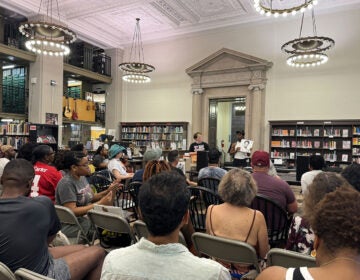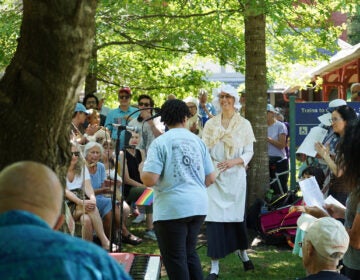The MLK turnaround – a view from the back of the room
The young man said, “You’re with the news?”
Yes, I said.
“I’m a student leader,” he replied, slender and thoughtful-looking in clean jeans and a blue windbreaker. “My name is Taylor Smith.”
We stood in the back of the auditorium at Martin Luther King High in Germantown. Up front, about sixty parents and teachers sat and listened while a professional moderator explained the evening’s agenda. Next year, as part of the Philadelphia School District’s Renaissance program, King will be under new management. Three different independent organizations are vying for the contract. On this rainy Thursday night, the District’s goal was to gather feedback from parents about what they’d like to see from King’s next administration.
A week before, like students at two other newly-designated Renaissance high schools, about 75 of King’s 1,000 students walked out of class to protest the shakeup. Smith wasn’t one of them. “Most of those kids, they didn’t even know what they was protesting,” he said.
Still, Smith said he understood the protestors’ frustration. The Renaissance process promised big changes – teachers leaving, new rules in place – and many students felt worried and uncertain.
Becoming a mentor
He paused and gazed down at the stage, where the moderator was passing out pieces of colored paper for parents to write on. Tell me about being a student leader, I said.
It’s a new program, he answered, involving about twenty upperclassmen like him – he’s a senior – who mentors younger students. “I work with the ninth graders,” Smith said. “When they first started coming to school, they didn’t want to come. We started a study group, and they’re starting to get the hang of it.”
The leadership program is the kind of thing King needs, Smith said. He’s seen too many people graduate, go on to college, and quickly find themselves completely overwhelmed. One friend of his recently dropped out of Drexel after less than a year. “When he graduated, he felt confident,” Smith said. “He was ready to take on new challenges. But the curriculum – it’s not high school anymore.”
It’s easy to skate though a school like King without learning much, Smith said. Even kids who think they’ve done well aren’t necessarily ready for the next level. “In classes now, we’ll go from one chapter, skip like four chapters,” he said. “I know a couple teachers where even if you’re just lollygagging, you can pass with a C or B, as long as you come to class and don’t get on their nerves.”
But the good teachers are really good – like his social studies teacher. “At first I couldn’t stand him,” Smith said. “But he cares. I look up to him, because he gets on me about cutting class. It’s teachers in here that really don’t want to see you sitting on the corner.”
A personal turnaround
By now, the moderator was breaking the audience into subgroups to discuss King’s curriculum, climate and culture. Smith has chosen to be a part of the Renaissance process, even though he won’t be at King to see the results. He sits on King’s School Advisory Council, the volunteer group of parents and community members that will review proposals from the three organizations that want to run King. The SAC will recommend one of the three to Superintendent Arlene Ackerman, who will make the final choice.
When we met, Smith hadn’t yet seen the proposals. But whoever wins the contract, he said, the job will be to bring order to a school where too many students act like he once did.
“I messed up my ninth and tenth grade years. I messed them up big time,” Smith said. “I had all F’s – F’s in every single one of my classes. I can’t blame no one but myself, because I was like a lot of students in this school. I wasn’t coming to class. I was in the hallways.”
He spent those years at Mastbaum Technical High, but he transferred after a confrontation with his electrical shop teacher. “He told me I was wasting his time. Now that I look at it, I did waste his time. And every time I see him, I thank him. He made me a better person.
“Like every kid, I like to be right all the time,” Smith said. “But you just can’t. You can’t be right all the time.”
Demanding more
Chatter rose from the subgroups below. Smith, whose mother passed away when he was young, said he’d never really confided in a grown man outside his church until he’d joined King’s student leadership program. One teacher in particular has become a friend. “At first, I couldn’t accept that I talk to another man about my problems,” Smith said. “But now, anytime I have a problem, he’s right there. He’s a family member to me now.”
Was that the kind of connection you were hoping to find when you left Mastbaum for King?
“I was looking for that discipline,” Smith answered quickly. “Discipline will take you a long way. And it took me all the way to my middle high school years to finally figure that out.”
Can this Renaissance change help more King students find that kind of discipline?
“It can help – it will help other students,” said Smith emphatically. “But the students have to put back. Lollygagging. I see plenty of it. Playing dice, gambling and whatnot. Some kids just don’t care.”
Does it matter what the adults in a school do? Can they make the kids care?
“Penny Nixon – you know who that is?” Nixon is now an assistant superintendent with the District. “She was my principal in middle school,” Smith said. “She made sure that everyone excelled. She didn’t like D’s or F’s. She would come and talk to you individually.”
That’s the kind of focused attention kids need, Smith said. Nixon was on his mind in part because she’d been at King on the day of the walkout. She’d met with Smith and other students to hear their concerns. Smith asked her to help preserve what he thought was important: the leadership program; the health program that convinced him to explore a career in nursing; the JROTC program that he says has given many kids self-respect and discipline.
Ultimately, it will be up to King’s next administration to decide those programs’ fate, but Smith said he was assured that his voice had been heard. He hoped that was the case, he said; students at King need a lot of help.
“The kids that go here are all smart in their own way,” he said. “The main thing is, we don’t got no study habits. We was taught how to do homework, but no one taught us how to study. This was the first year I actually started studying. And that’s a main focus of next year – how many hours do you need to need to study? How do you study? What notes do you take?”
It’s not easy to be a student, is it? I asked.
“It’s not,” said Smith.
A push in the right direction
By now, the meeting was over. The moderator had gathered the colored sheets. Parents and teachers were filing up the aisles, laughing and chatting, stopping to pick over the buffet. Next year, Smith hopes to be in college. I asked Smith when he’d started seriously considering that kind of a future.
“I’m not going to lie – this was my first year that I was really positive I was going to college. Nobody had ever really asked me about college,” Smith said. “I was just going to go to trade school.” A mentor at his church – Grace United Methodist, at 71st and Ogontz – started pushing him hard last summer.
“He’s here today,” said Smith. “Hey Pop!” he called, and up came a tall, gray-bearded man wearing a green jacket and a wide smile. Franklin Lockwood, a retired Police Academy instructor, laughed and said yes, it was true. “We have other youth in our church, but he’s the most promising,” he said. In a few weeks, the pair will visit Temple to learn more about its nursing program. Meanwhile, a whole group of adults also help support Smith. “We all participate,” Lockwood said. “We take him places, we feed him – and he can eat.”
No matter what happens at King next year, Lockwood said, parents and mentors will always have to take the lead when it comes to keeping young people like Smith on the right path. Lockwood came tonight at Smith’s request, but he won’t be involving himself deeply in the community discussions about King’s next administration. Instead, he’s focused on making sure Smith starts practicing for his SATs.
“I’m on him: ‘Get the book! Get the book!’” Lockwood said as the room emptied around him. Smith stood by his side, a slightly embarrassed smile on his lips, one of over 7,000 Philadelphia students at ten high schools being transformed by the Renaissance process. “I said, I’ll pay for it,” said Lockwood. “Just go get it.”
WHYY is your source for fact-based, in-depth journalism and information. As a nonprofit organization, we rely on financial support from readers like you. Please give today.




